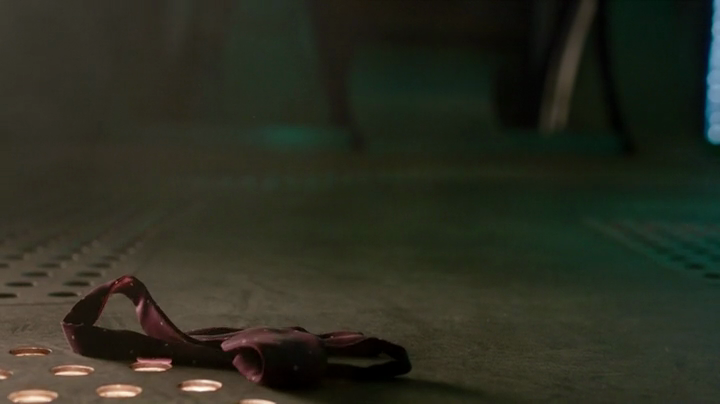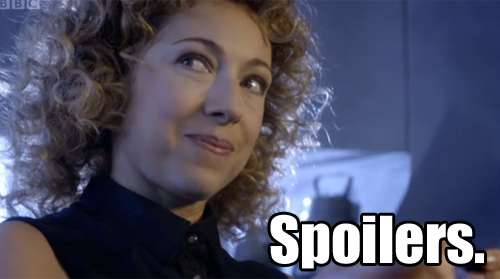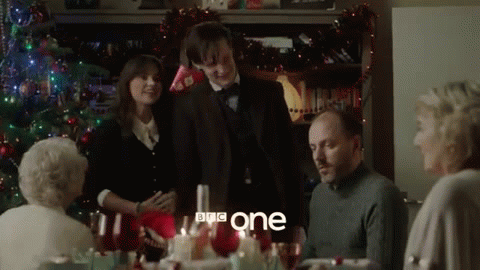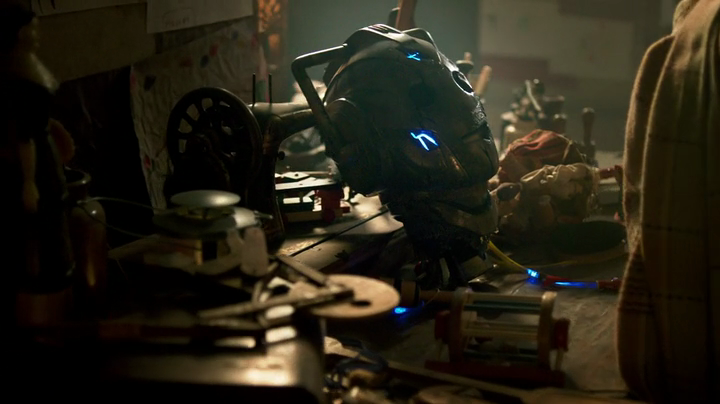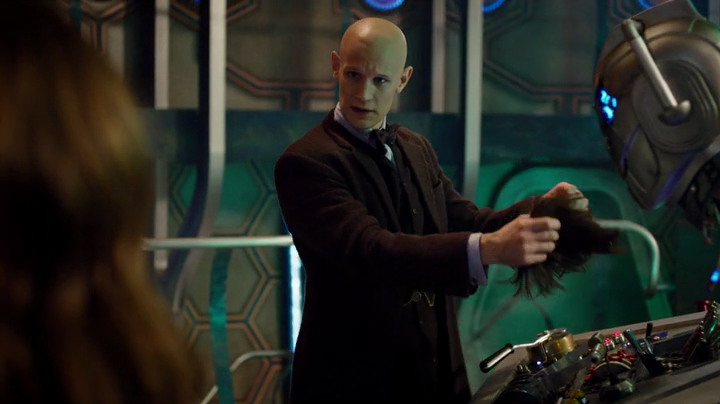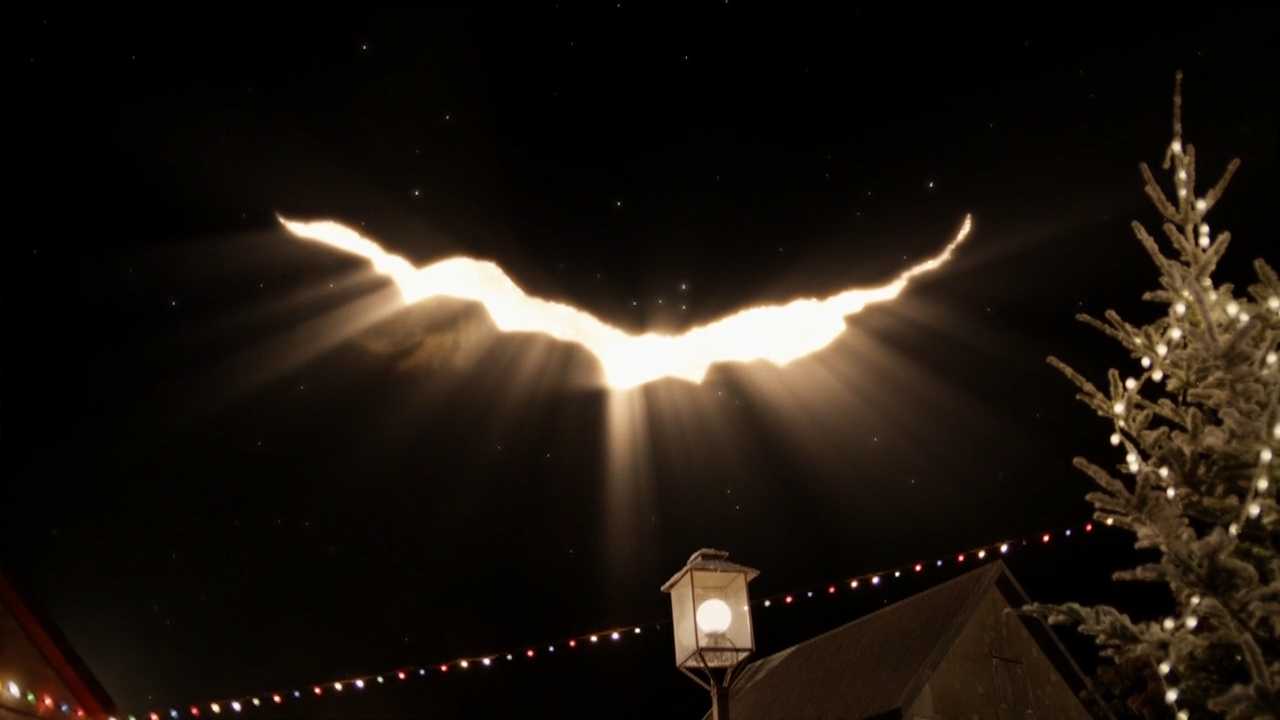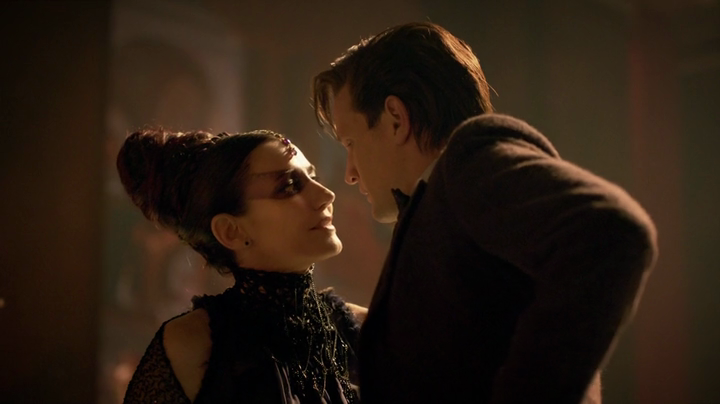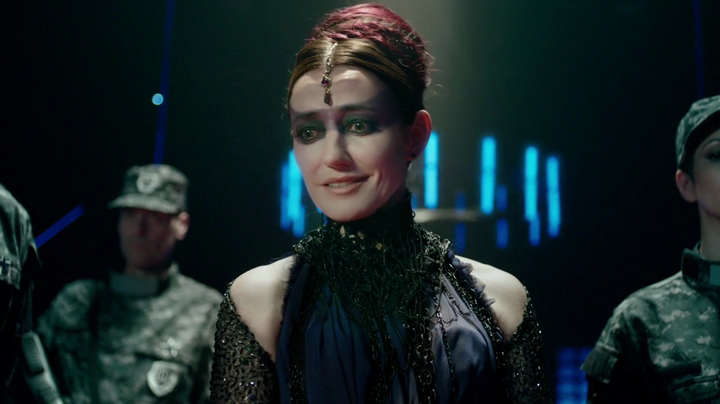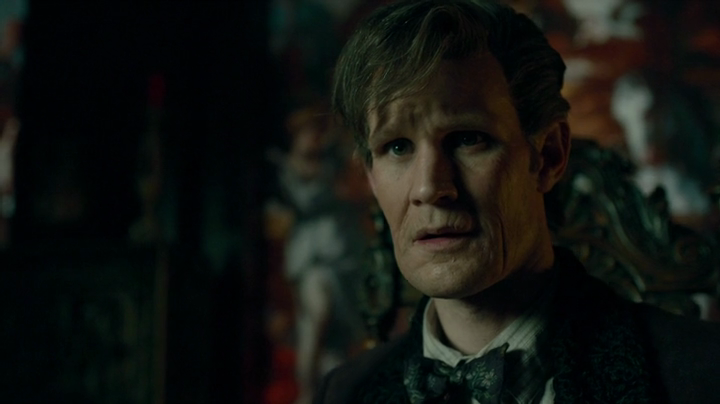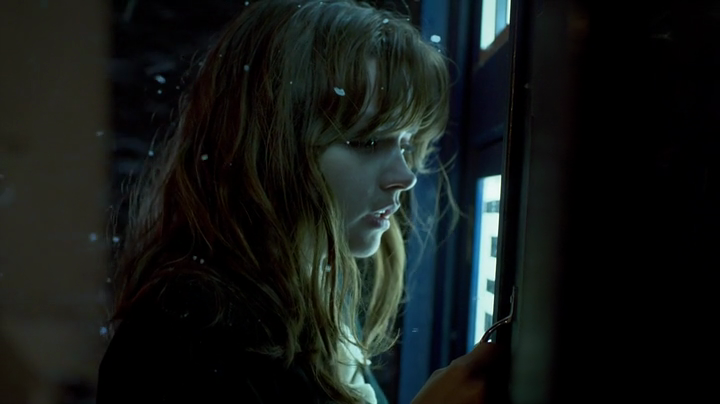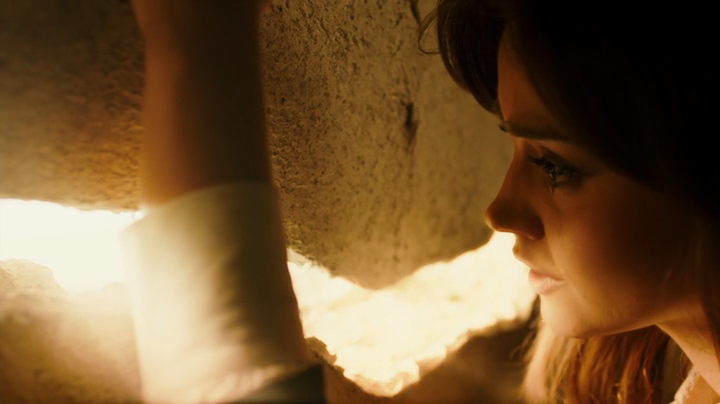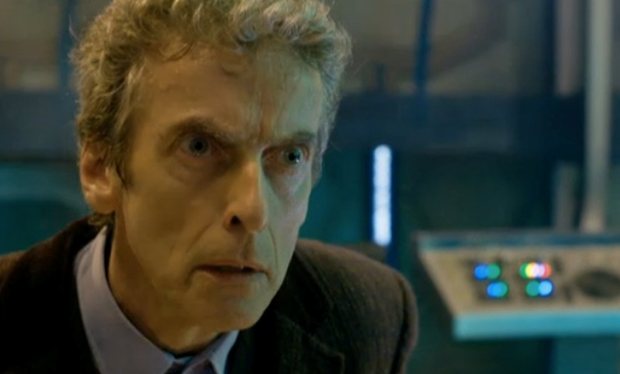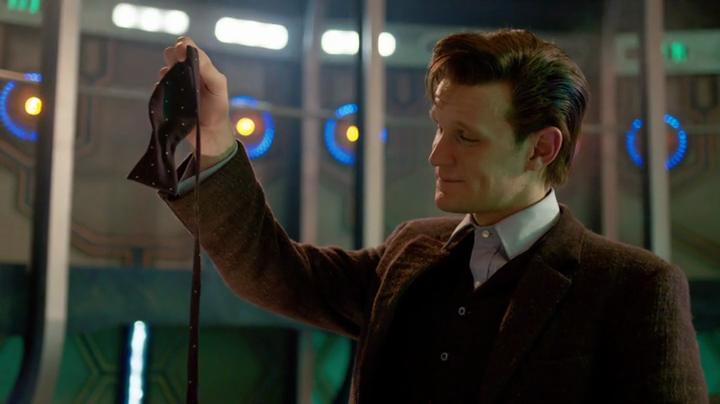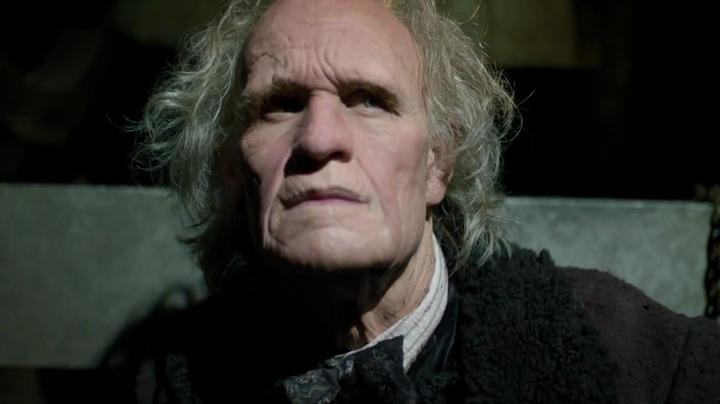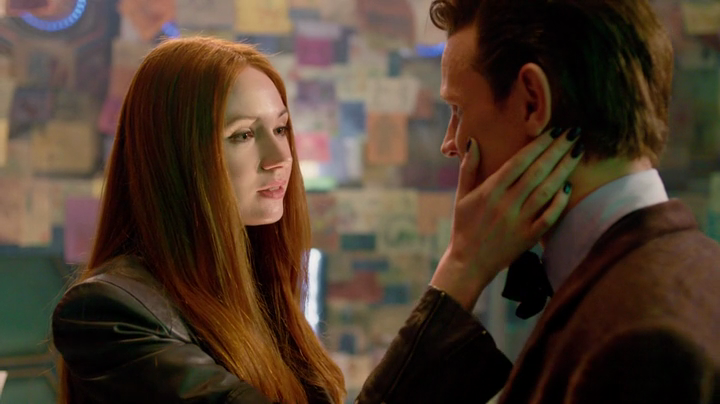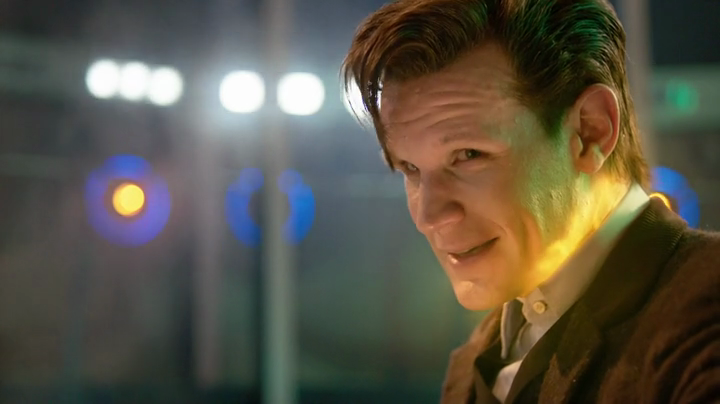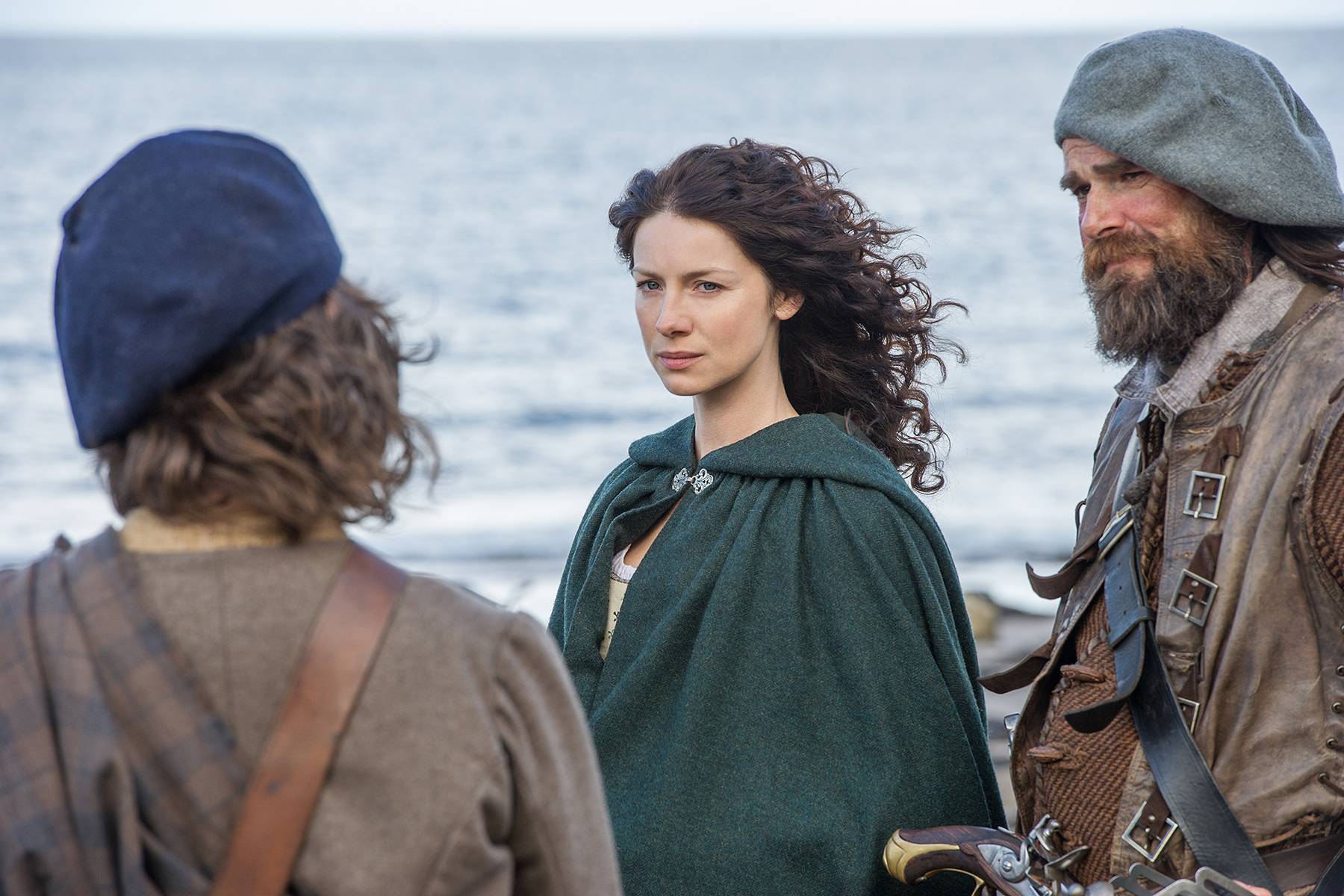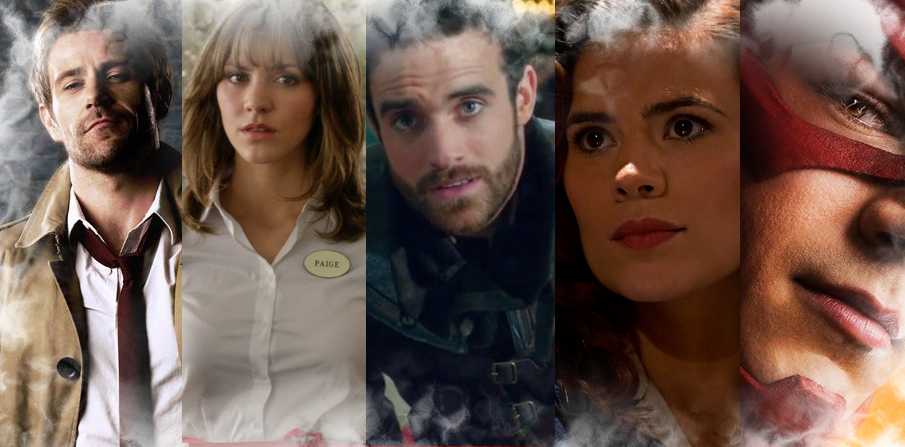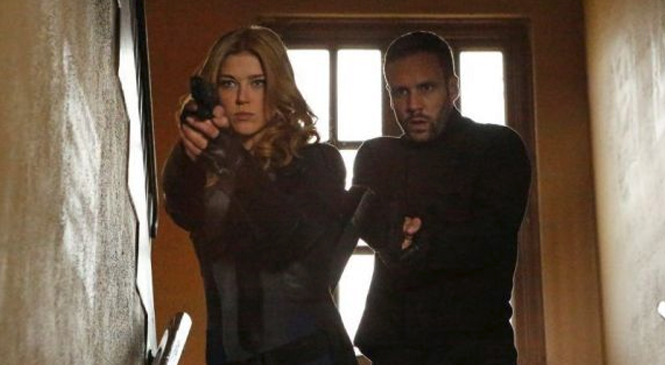Mr. Harvey On THE TIME OF THE DOCTOR
“And now it’s time for one last bow, like all your other selves. Eleven’s hour is over now, the clock is striking Twelve’s.”
And so Matt Smith’s story as the Doctor ends.
I’ve watched “The Time Of The Doctor” about a dozen times since it aired on Christmas Day, and have sat down to write this a couple of times before this version. I think I knew that it would be hard to have the kind of sendoff for Smith that I was hoping for, since he’s my favorite incarnation of the Doctor since Tom Baker, and to be honest, I was right. This isn’t quite what I was hoping for in his last spin around the TARDIS, and its about half rubbish and half genius, but in the end, I’m left with the same feelings I had when I watched it the first time…
I’m hating to see Matt Smith go.
Spoilers follow of course, as in only natural. In fact… let’s see here…
There, that seems fitting.
Right, so let’s start with the rubbish shall we? Because unfortunately there is a lot to discuss that isn’t all that grand, and that is terribly disappointing. Some of this is technical, i.e. the editing and directing of the show. I can’t find a listing for the editor, but “Time Of The Doctor” was directed by Jamie Payne, who directed “Hide”, one of my favorite episodes of the season, and some of the blame has to fall at his feet, and at the feet of the unnamed editor, although I’m giving them some credit for parts of the episode that worked really well. I suspect that they were hamstrung by the 60 minute runtime, because this is certainly a story that needed more time to breathe, and it doesn’t matter how good a director and editor you are, when you have this much to cram into an episode, it’s going to be rushed and cramped, and the pace is going to be all over the place. And it is, sad to say. Moments that should be allowed to linger and breathe rush by, and time is wasted on scenes that just drag and serve no real purpose to the larger story. And the tone… gahh.
Which brings us to the real problem: The writing. Now I am no fan of the rather sizable amount of Moffat-hate out there, and am very much a fan of the stuff he’s written that works, but am also keenly aware that just like everybody else, Steven gets it wrong sometimes. When he gets it right, like “The Day Of The Doctor”, it’s magic, when he doesn’t, like, say, “The Angels Take Manhattan”, it’s kinda painful. Here his script is all over the place, with really great moments right and left, broken up by really terrible ones. For example:
Why? Why did we have to spend time with Clara’s family? I’m not saying that we shouldn’t, although if that means we can never have “Linda” cross our screens again, that could be OK. It seems, although it isn’t clear, that she’s Clara’s step-mother, which means that Clara’s dad is in fact an idiot, since he’s married that horrible family member that we all dread seeing over the holidays; you know, the one who is going to “tell you what your problem is”? Yeah, that one. And as cute as the whole “You’re my boyfriend” bit is, it’s wasted time when you look at the story that Smith, Moffat and Co are telling us here. Sure, family is part of the whole Christmas Special thing, but losing it and giving that time to the real story would have been soooooo much better. At least Gran is pretty cool, and her story of meeting her husband for the first time is Moffat getting it right, in the midst of a scene he’s getting terribly wrong.
And there is a lot of Moffat in here. It’s kind of a greatest hits episode, both his and Matt Smith’s, and while I think some of that works, and I’ll talk about that in a bit, some of it just doesn’t. The Weeping Angels just burn up screen time, the Cybermen — aside from Handles — are just padding, and the Sontarans are JUST AWFUL. Their appearance is almost redeemed by the Church of the Papal Mainframe’s apology for killing them… almost. I’m not sure who’s telling Moffat that the Sontarans need to be played like a joke, but they really, really don’t. Strax works because he’s a psychotic warrior who has become a nurse and a butler and he’s OK with that. That’s where the humor lies, not in a bunch of military idiots saying stupid things. It really has a mix of Moffat’s best and worst traits as a writer here, and those worst traits just stand out glaringly.
And then there are the Time Lords. Leaving aside the fact that their message has been broadcasting throughout all time and space and we’ve only had a couple of references to it before, important though they were, it’s really a daft plan they’ve come up with here. This is, actually, fairly well in keeping with some of their other plans, a la “The End Of Time”, which Moffat can’t be blamed for, but let’s review, shall we? So, trapped in their pocket universe, frozen in time, the Time Lords find the scars of the cracks in time that the Eleventh Doctor encountered in his first season, and send a message through. The message is the First Question, “Doctor Who?”, and the idea is that the Doctor will get the message, tell them his true name, and they will know it’s safe to return to the Universe. OK, fine, except the message is broadcasting through all of time and space, evoking a sense of dread and fear in all who hear it, and consequently drawing all of those who might have a reason to NOT want the Time Lords to return to the source of the message, armed to the teeth, thus ensuring that there is no way for it to be safe for the Time Lords to return. Perhaps a slightly more subtle approach was in order? And really, why is the Doctor’s real name the key? Sure, it’s always been a mystery of the character, but we are never going to get the answer, c’mon, we all know that.
But. But. But.
There are joys here. There really are.
Handles, the Cyberman head, who was only on camera for a few moments and still died with impact. Matt Smith’s shaved head (actually a skullcap hiding his buzzcut), and his “spaceship fin” ears, a wooden Cyberman and Time Vortex cooking classes. Fun madness that is perfectly natural for Doctor Who.
A lot of what’s crammed in here is continuity. Something to bear in mind: For the majority of Doctor Who‘s run, continuity wasn’t much of an issue. That’s why UNIT’s timeline makes no sense, and that books like The Discontinuity Guide had such successful runs. And that was pretty much the norm for most television then, with only soap operas having long story arcs that built on previous seasons. Think about Star Trek, The Man From U.N.C.L.E., Battlestar Galactica or shows like M*A*S*H. All of them were episodic, and if you were looking for character arcs or long stories, or episodes that didn’t contradict previous ones, you were not going to find them on television in the 60’s, 70’s or 80’s. Internal continuity is a fairly recent thing, and if you’re older than 30, you know that.
When Doctor Who returned, it came back in a world where internal continuity was the norm, and it followed suit, with season long story arcs, references to the Original Series and previous Doctor’s being thick on the ground. Both Russell Davies and Steven Moffat left story lines dangling to be picked up later, and both had success and real issues resolving them. Here, Moffat brings back the Cracks in the Universe, Silence Will Fall, The Silence, The Church of The Papal Mainframe, Trenzalore, The Fall Of The Eleventh, The First Question, and makes it all work in what is a really fairly coherent and satisfactory manner. Really, it is.
So the First Question is the Time Lord’s message, broadcast through the Cracks. The Church of the Papal Mainframe track the message to Trenzalore, and quarantine and protect the planet from the massing fleets. The Doctor discovers the Question, and in order to keep the Time War from re-igniting, the Church becomes the Church of the Silence, dedicated to keeping the Doctor from speaking his name. While the majority of the Church does that by protecting the Doctor and Trenzalore, a sect of the Church, led by Madame Korvarian, breaks away and travels back to the Doctor’s past to try and kill him so that none of these events can come to pass,. In the process though, they destroy the Doctor’s TARDIS and cause the Cracks to come into existence in the first place, creating a paradox that ensures that the very thing they wanted to stop was destined to happen. This explains why the Church’s first appearance has its soldiers and priests venerating the Doctor, and yet later treating him as an enemy. Interestingly, it casts Korvarian in a slightly different light. Sure, she was a monster, and her methods were monstrous, but her goal was saving the Universe from a new Time War. Considering the effects the first one had, one can kind of understand her hatred of the Doctor, the last surviving Time Lord, and the one could bring them back. Kind of.
And can we talk a moment about Tasha Lem? ‘Cause I’m loving me some Tasha Lem. The Mother Superious of the Papal Mainframe is bloody wonderful, and a large part of the credit goes to the lovely and talented Orla Brady, who carries supreme power, intelligence and sensuality with ease. Clearly someone who knows the Doctor of old, and has had a… hmmmm, shall we say, intimate relationship? Yes, yes we shall, considering the body language and undercurrent of their exchanges. Another in the Doctor’s long list of friends who have channeled their inner demons into forces of change, Tasha is strong enough to fight back the Dalek nanites that have turned her into one of their Puppets, and lead the forces of the Church in an all out war against them for hundreds of years, all the while being technically dead. I want more of this lady frankly, as she’s a fascinating character all on her own. And did you notice, she was killed and then, well, “rose from the dead” three days later? What effect might that have on the Church one wonders…
Interestingly, Tasha has been used by some of the I-Hate-Moffat brigade as an example of Moffat’s supposed sexism, specifically referencing the kiss the Doctor gives her after she throws off the Dalek control. Leaving aside the fact that this incarnation of the Doctor has kissed a LOT of people, and I can’t seem to find much in the way of complaints about him kissing Rory or Craig or any of the other male characters, the other example that it’s connected with is the Doctor’s kissing Jenny in “The Crimson Horror”. As I wrote back when I reviewed that episode, I was no fan of that kiss either, what with Jenny being married and a lesbian, and her and the Doctor’s relationship not being at all the kind of friendship that would have let that kiss be appropriate.
This is not at all the same thing, with the relationship between Tasha and the Doctor clearly being much more flirtatious, maybe being even sexual, and her “never kiss me without my permission” playing much more as her sparring with her friend, given the interaction between them before and after. I confess that I don’t see the sexism that others seem to in Moffat’s writing, especially with the number of strong women he’s created for the show, though he’s blown it more than once, such as the whole Amy pregnancy arc and Young River Song, but that’s more a bad writing thing to me. Not to say that those who do see sexism there are necessarily wrong, just that I’ve never found the arguments compelling. To me, I’ll take Amy and River, Jenny and Vastra, Clara and Tasha over Davies’ lovestruck Rose, who wrecked her family, destroyed her relationship with her boyfriend of many years to run away with a guy she just met, then swooned over for years before settling down with a less-than-exact copy of the man she was supposedly in love with.
Aaaaannywayy… More Tasha Lem please.
And then there’s Trenzalore, where the Doctor is destined to die and be buried. He knows this, because he’s seen it, and finding himself there again is less than ideal. But where we saw the giant field of graves of the fallen, here we see the small human colony of Christmas, and the place the Doctor will spend centuries defending against the massed forces of the Universe. Here is where we spend the bulk of the episode, and while not all of it works (Really? About 500 years pass and there’s no technological advancement? You know what would have fixed that? One line about the colonists wanting a simpler life, like the Amish or the older order Mennonites.) it’s clear that this part is meant to be what Moffat talked about years ago, when he said he wanted to make Doctor Who akin to a fairy tale.
Related: 3-Minute Recap of “The Time of the Doctor”
The narration from Tasha is the main clue there, as clearly she is telling a story. The other elements that play in are things like the too-cute-by-half Town Named Christmas, and the aforementioned lack of change over time, as well as the role the Doctor plays in the town; sort of a wise old wizard/teacher/protector. And of course the Time Lords giving the Doctor a new regeneration cycle was pure fairy tale, for better or worse. These sort of things, if they had been allowed to be the majority of the episode would have made it something quite special, but alas, the family comedy/hologram-nudity bits kept coming back, throwing off the tone. It would have been something quite interesting, since so much of Matt Smith’s Doctor was about the story of the Doctor. Not to say the changes in tone didn’t have some effective moments, because there were some good shifts, like the shift from humor to horror when Tasha revealed that she had died. Still, the scenes where it felt like a story being told, with moments of being within the story worked best for me.
But what of the Doctor’s future?
We knew the 12 regeneration limit was coming, and until “The Name Of The Doctor”, we were working under the impression that we were on the 11th incarnation. Of course we learned that the War Doctor made it the 12th, and the long speculated almost-regeneration of the 10th Doctor moved the count to 13. On one hand, putting the solution to that thorny problem in the mix might seem like just one more crammed in plot point, but it does get the question and the problem out of the way, which, since we know the BBC isn’t just going to say “hey, he’s used up all his regenerations, the show’s over”, was going to be dealt with one way or the other. And there certainly is precedent for this particular solution, as the Time Lords offered the Master a new regeneration cycle back in “The Five Doctors”, and again if he would serve as their agent in the Time War. Is it a little bit Tinkerbell-clap-your-hands-together? Sure, but again, in the story context, it works, especially since the Time Lords are sacrificing their return, at least for now, to save the Doctor. And we have a new regeneration cycle, a new set of 12, and decades more of the Doctor, and that I cannot complain about. Of course there is the question of the future the Doctor already saw, that of his grave among the millions who died at Trenzalore, but the whole point is that the future can be changed, so that would have been a possible future that simply didn’t come to pass.
But wait, you may be asking, what about “The Name Of The Doctor”, the Great Intelligence and the Claras through the Doctor’s timestream? Well, as I see it there are a couple of options here: First, that future has been averted, and doesn’t actually happen, so this version of Clara, who is the original version anyway, doesn’t splinter and save the Doctor throughout his life because she doesn’t need to, since the Great Intelligence never will enter the Doctor’s timestream. This is, I know, problematic, in many ways, so I’m going with the more common, and more (heh) satisfying time travel explanation, where since the Doctor and Clara have already lived through those events, and that future has been averted, it happened, but the future has been changed so it doesn’t matter that it happened, because the timeline has been changed to one where the Doctor survived. Clara is still the Impossible Girl, the Great Intelligence still did it’s thing but the outcome is different. Confused? OK, it’s a Timey-Wimey thing. Wouldn’t be the first time the Doctor changed the future, and it won’t be the last. The end result is largely the same though, as Trenzalore is still the sight of a war that killed millions, and the Doctor reached the end of his life there… he just got to start a new one, more or less.
Speaking of our Miss Clara… I’ve been most pleased with what has been done with her these last two post-Impossible Girl stories. In “The Day Of The Doctor” she was the voice of compassion and hope for the Doctors as they faced again the moment (pun intended) where they had none. In our review/discussion of the 50th Anniversary Special, I erred by saying she didn’t have much to do in the story, but on repeated viewings it was clear that she drove a LOT of the emotional part of the story, especially when she was having a hard time seeing the man she had come to know become a mass murderer, no matter the reasons. Here though, she drives something that I haven’t talked about yet, and that is the intimate part of the story, and what I mean by that is the very personal part of the Doctor’s journey here. For hundreds of years, the Doctor stays on Trenzalore, and cares for and protects the town and it’s people, and he did it alone. Well, he had Handles, but even then, he was, essentially, alone. Sure there were the townspeople, but they would grow old and die generation by generation, and they weren’t his Companion. They weren’t his friend. Clara returns to Trenzalore to be with him because she’s his friend, and she doesn’t want him to save her, she wants to stand beside him. It’s brave and sweet, and it’s what makes Clara a good Companion. And she does what the Doctor has proven to be absolute crap at, over and over: She asks for help. She’s the one who turns the Time Lords request for help around on them, and she’s the one who makes it clear:
“His name is the Doctor: all the name he needs, everything you need to know about him.
And if you love him — and you should — help him. Help him.”
She’s his friend, and that’s what a Companion should be.
Before I get to the hard part here, let’s talk about Peter Capaldi, and his moments as the 12th Doctor. They are seconds really, but the grey hair, the piercing eyes and (yay) what appears to be his native Scottish accent all made me smile. I’ve been a fan of his since Local Hero and The Lair of the White Worm, and was quite happy with him becoming the next Doctor. I’m looking forward to seeing him make the part his own.
And now the hard part. Saying goodbye.
Matt Smith is the youngest actor to play the Doctor, and that caused a lot of consternation back when he was announced, but I think he’s done a wonderful job making his Doctor a fantastic addition to the many excellent incarnations of our favorite Time Lord. I liked him from the first, but then I’ve always been a fan of our more alien versions of the character. As I said at the beginning, Tom Baker was my Doctor, and his 4th incarnation was all kinds of alien, again and again separating himself from the humans around him with the way he faced the universe and its joys and dangers. Smith had that same kind of alien-ness to him, that separation, and while it was often played for laughs, and Smith was superb at comedy, there was also that loneliness and isolation that came through so poignantly.
His bonding with Amy Pond wasn’t just because she was the epicenter of the Cracks and “The First Face This Face Saw”, but because he was, he always is, lonely. And he was a Doctor in pain a lot, from carrying the weight of his actions in the Time War, to seeing over and over the spaces between himself and the people he loved, whether it was realizing that he needed to save Amy and Rory by letting them go, or falling in love with River, knowing that he would have to watch her die. He revelled in the joy of new world and new challenges, got to speak to the one woman he loves most of all face to face when the TARDIS became Idris, and faced the end of his own journey at Trenzalore with humor and bravery, knowing he would die there but saving every life he could in the process. He saved the Universe over and over again, railed against injustice, and faced his enemies with a bravado and energy that was just damn fun to behold.
He made bow ties cool.
My favorite Smith Doctor moments were when the age of the Doctor came through. The moments when the old man, over a 1000 years old, played across his face and through his voice. Smith was/is a master at showing that the youthful face is a mask, and the old man underneath is the true face. Young at heart, but carrying those years, and all the pain that has accumulated over those years. We first saw it truly in “The Big Bang”, but again and again, that young mask slipped, and here, in “The Time Of The Doctor”, it played out over centuries. I’ve read some criticisms about the Doctor getting old, since we know that this body has made it through at least 200 years without showing any real signs of aging, but remember, this story takes place over at least another 400 years. That’s this body lasting somewhere around 600 years, and we know Time Lords age, however slowly. And to me, the old age makeup works, better than a lot I’ve seen, especially at the end, where the Doctor starts to look an awful lot like his first incarnation. I don’t know if it was intentional to make Smith resemble William Hartnell, but I suspect it was, and I liked it. And I like the Doctor as a dying old man… facing his death with dignity in the face of failing, going to his death with the knowledge that he’d kept generations of people alive and safe, even if he couldn’t do it anymore.
It was, as I said, a sort of greatest hits kind of episode. The Doctor shouting up at enemy spaceships? Yeah, we’ve had a few of those, so check. The Doctor not really understanding the details of human interaction? Lot of those, sure, so check. The old man, hiding behind a youthful guise? Check, and mate. It was a good way for Matt to go out. Not a great way, but a good way. The story problems got in the way, but Matt Smith’s final portrayal of the Doctor was everything I could ask for. And that moment with Karen Gillan was lovely. It was a nice way to bring it all around again, and one for which this fan was grateful.
I’m going to miss Matt Smith as the Doctor. Sure, this last season was erratic and, for me, not as satisfying as the previous two, but it was never because Matt didn’t give us a great performance. I’m looking forward to Peter Capaldi, but his Doctor is many months away, and Matt is gone now.
I’m going to leave you with Matt’s final words as the Doctor, the words that made him cry during the first read through of the script months ago, and words that clearly were more than just the 11th Doctor saying goodbye.
And this from me: It was an excellent run sir, and I thank you.
“We all change. When you think about it, we’re all different people all through our lives, And that’s OK, that’s good, as long as you keep moving, as long as you remember all the people that you used to be.
I will not forget one line of this, not one day, I swear. I will always remember when the Doctor was me.”

